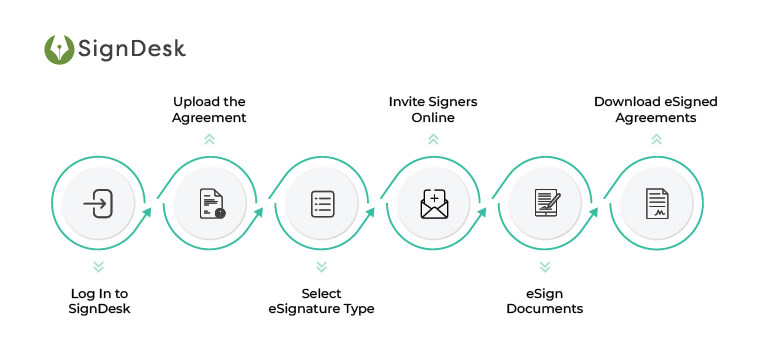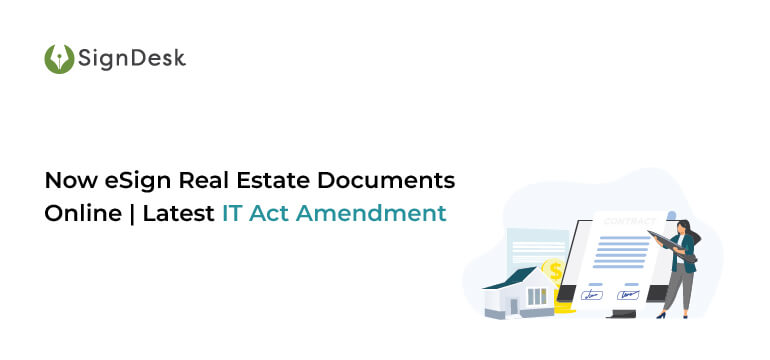Introduction
The Ministry of Electronics and Information Technology (MeitY) has released a notification stating an important amendment to the Information Technology Act, 2000. The First Schedule of the IT Act, which contains a list of documents or transactions to which the act does not apply, has been amended. The notification for the IT Act amendment was issued by MeitY, on September 26th, 2022.
Several documents have been removed from the negative E-Sign list, including key real estate and property agreements. The exclusion of contracts for the sale or conveyance of immovable property from the First Schedule to the IT Act is substantial since it enables real estate transactions to now be executed electronically.
The Latest IT Act Amendment – A Brief Overview
The Ministry of Electronics and Information Technology released a notification on the 26th of September 2022, stating amendments to the IT Act. As per the notification, various documents that could not be executed via electronic means have now been excluded from the list.
Negotiable instruments governed by RBI/ NHB/ SEBI/ IRDAI/ PFRDA, Power of Attorney documents for businesses regulated by RBI/ NHB/ SEBI/ IRDAI/ PFRDA, as well as contracts for the sale or conveyance of immovable property or any interest in such property can now be enforced electronically after the IT Act amendment was officially issued.
With eSign now being extended to property agreements, the real estate sector can enable large-scale digital documentation.
IT Act Amendment – Expanding Opportunities For Real Estate Document Digitization
The First Schedule of the IT Act has been revised to include the entries for many documents like NIs, PoAs, etc., to be signed using eSignatures. The amendment also includes immovable property-related contracts, which implies that a large number of real estate documents used very frequently can now be completely digitized & executed via eSignatures.
According to the IT Act amendment, this change is applicable to any agreement pertaining to the conveyance or sale of immovable property. Such documents include sale agreements, conveyance deeds, mortgages & several other property documents. It is now possible to execute these documents digitally using electronic signatures.
This is a significant step towards broadening the scope of digitization in the country as the amendment paves the way for accelerating the process of digitization of documents and transactions that were previously exempt from the IT Act 2000.
Which Property Documents Can Be eSigned Post the Amendment?
Following this IT Act amendment, any contract that is created for the sale or conveyance of immovable property is now permitted to be eSigned. Documents like property sale deeds, real estate conveyance agreements & property purchase agreements.
These contracts are essential to any real estate sale or conveyance transaction, & the amendment simplifies carrying them out. These activities become more convenient as buyers & sellers can remotely sign the contracts using eSignatures & carry out the agreements more easily.
The conveyance of immovable property involves mortgages, which conveys that contracts like Memorandum of Deposit of Title Deeds can be digitized & executed using eSign. Additionally, sales deeds and agreements can also be eSigned.
The digitized versions of such real estate documents are equivalent to the physical variety & electronic signatures used to implement them are valid in courts of law.
How to eSign Property Documents – In 6 Easy Steps
State-of-the-art eSign software platforms like SignDesk provide real estate businesses with web portal integrations, APIs & applications that help their customers eSign real estate documents.

By integrating with an eSign workflow, real estate businesses can complete signatures on property agreements in minutes. The eSign process includes:
Step 1- Log In to SignDesk
The user logs in to SignDesk’s eSign portal to execute multiple property documents
Step 2- Upload the Agreement
The user uploads sale deeds/conveyance agreements/mortgage deeds in bulk or creates the required documents on the portal. Template & clause libraries assist in this process & help the user draft documents faster en masse.
Step 3- Select eSignature Type
The user can choose from various options such as Aadhaar eSign, digital signature certificate or DSC-based eSign, or OTP-based electronic signature
Step 4- Invite Signers Online
The user sends out an eSignature invite to all the parties involved in the transaction by entering their email address or mobile number (Aadhaar-linked mobile number in the case of Aadhaar eSign). A link is sent out via SMS & email.
Step 5- eSign Documents
The signers follow the link that directs them to the property documents & enter the OTPs or private keys (for DSC). The agreements are subsequently electronically signed.
Step 6- Download eSigned Agreements
All the parties can download the eSigned documents which will be emailed to them. A document containing the details of the eSign transaction will also be sent for reference & easy audits.
How Can Real Estate Businesses Benefit From this Amendment?
After the IT Act amendment, many industries especially those operating in the real estate business can accelerate & improve the efficiency of their mandatory agreement workflows. They can do so by completely digitizing routine property documents which enables speedy & scalable implementation.
Some of the major advantages of leveraging eSignatures include:
- Improved access & user convenience: eSign for real estate firms helps users from across the country complete their property transactions conveniently. It enables buyers & sellers to access property agreements & sign them remotely.
- Easy collaboration with multiple parties: eSign workflows are designed to allow multiple parties to sign on a single document. Real estate businesses can add multiple buyers to a property document & execute them seamlessly.
- Workflow trackability: eSignature solutions offer real estate businesses the ability to track the activities of agreements in real time. Platforms like SignDesk make the process easier for businesses by sending out automated emails & SMS invites for signers, allowing them to track the status of the signature workflow & emailing eSigned documents to all the parties.
- Transparent agreement management: An intuitive dashboard allows them to manage & store bulk documents digitally on a single platform. Managing several types of documents, with different eSign requirements becomes simpler with a smart dashboard.
- Accelerated agreement execution: eSign helps reduce agreement execution TAT from 10-20 days to just 10 minutes. This decrease is a major advantage for real estate businesses as they can execute multiple deals at a fraction of the time otherwise needed.
Digitize Agreements & eSign Instantly With SignDesk
The IT Act amendment is an essential milestone towards broadening the scope of digitization of various documents, including those related to property transactions in India. Real estate firms can utilize platforms like SignDesk, a one-stop solution for real estate document workflows.
SignDesk’s real estate eSign software is integrable with a digital stamping facility that can make executing property documents simpler & much faster. In addition, a complete contract management system helps these businesses smartly manage their property-related documents throughout their life cycles.
Get in touch with one of our eSign experts to see how you can simplify routine agreement procedures with SignDesk.
